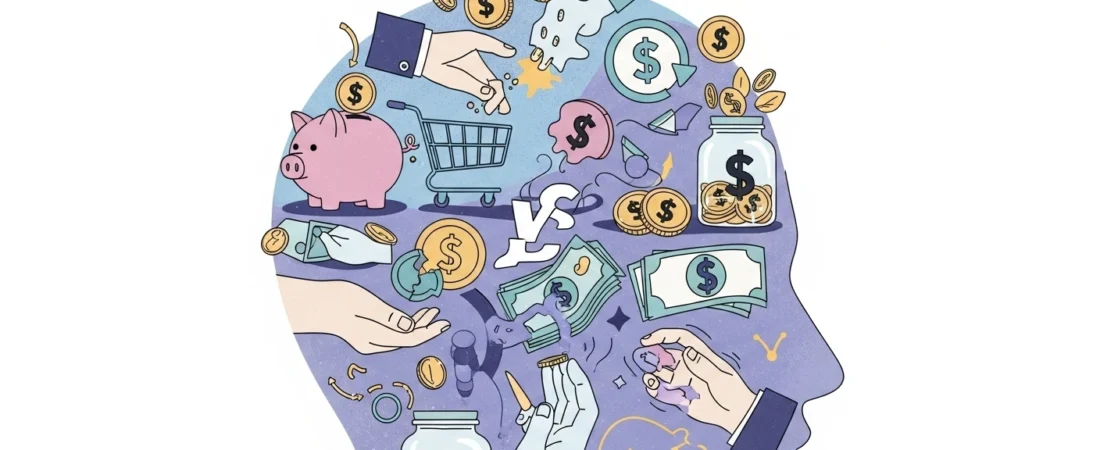Money plays a central role in our lives. It influences our daily choices, shapes our future, and often dictates our anxieties. While economics provides a framework for understanding markets and financial systems, it is the often-overlooked field of behavioral psychology that truly illuminates why we handle money in the ways we do. Our financial decisions are not always rational; instead, they are deeply rooted in emotions, biases, and ingrained habits.
The Allure of Spending
For many, spending brings immediate gratification. This instant reward triggers dopamine in the brain, creating a sense of pleasure. Marketers understand this well, crafting campaigns that appeal to our desires for status, convenience, or happiness. Consider the latest smartphone: its advanced features may be appealing, but the desire to own it often stems from a deeper need for social connection or perceived status. We might justify a significant purchase by focusing on its supposed long-term value, even when a less expensive alternative would suffice. This phenomenon, known as rationalization, allows us to align our emotional desires with what appears to be a logical decision.
Another powerful driver of spending is social influence. We often look to our peers, family, and even media portrayals of success to gauge our own financial standing. Keeping up with the latest trends or matching a neighbor’s new car can lead to impulsive spending, driven by a fear of missing out or a desire to conform. This can create a cycle of escalating expenses, where our spending habits are more influenced by external pressures than by our personal financial goals.
The Discipline of Saving
Saving, by contrast, demands delayed gratification. It requires us to forgo immediate pleasure for a future benefit. This can be a significant psychological hurdle. Our brains are wired for the present; future rewards often seem less tangible and therefore less motivating. This explains why many individuals struggle to save consistently, even when they understand its importance.
However, certain psychological factors can encourage saving. Establishing clear, specific goals significantly increases our likelihood of success. Saving for a down payment on a house, a child’s education, or retirement makes the abstract concept of “saving money” concrete and meaningful. Furthermore, automation of savings can bypass the need for constant conscious effort. By setting up automatic transfers from a checking to a savings account, we remove the decision-making process, making saving a default behavior rather than a deliberate choice. The feeling of security and peace of mind that comes from a growing savings account also serves as a powerful psychological reward, reinforcing the positive habit.
The Puzzle of Self-Sabotage
Perhaps the most perplexing aspect of our financial behavior is self-sabotage. This involves actions that undermine our own financial well-being, despite our intentions to do otherwise. One common form is procrastination. We know we should create a budget, review our investments, or plan for retirement, yet we postpone these tasks indefinitely. This often stems from a fear of confronting unpleasant truths about our financial situation or simply from the overwhelming nature of these tasks.
Another form of self-sabotage is overspending fueled by emotional distress. When feeling stressed, anxious, or sad, some individuals turn to spending as a coping mechanism. This retail therapy offers a temporary escape, but it can lead to mounting debt and exacerbate existing financial problems. This cycle highlights the deep connection between our emotional state and our financial choices.
Finally, cognitive biases frequently lead us astray. For instance, optimism bias can lead us to believe that financial hardships will not affect us, or that we will easily recover from poor decisions. This can result in insufficient saving or taking on excessive risk. Similarly, herding behavior sees us following the financial trends of others, even when those trends are not sound for our individual circumstances. We might invest in a trending stock because everyone else is, rather than conducting our own research.
Understanding the psychological forces that shape our financial decisions is the first step toward gaining control over our money. By recognizing our innate biases, our emotional responses, and the societal pressures we face, we can begin to make more conscious, informed choices. Taking active steps to set clear goals, automate good habits, and seek professional guidance when needed empowers us to move beyond instinctive reactions and build a more secure financial future.
